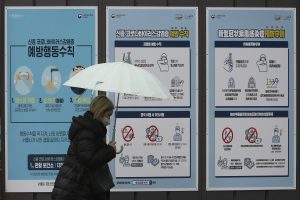SEOUL, South Korea — From Hollywood darling to international pariah in a matter of weeks – that’s South Korea.
The country is not used to being under the international spotlight, unless it’s in connection with the belligerent northern neighbor. So the news of the movie Parasite’s sweeping wins at the Oscars was fantastic — yet short-lived. Now South Korea is wrestling with the shock and shame of harboring the largest coronavirus outbreak outside of China.
It’s not quite the opening scene from The Walking Dead, the zombie apocalypse drama, where the main character Rick wakes up from a coma to find his town devoid of any sign of life. But the South Korean capital of 10 million people — or more than 25 million, if one counts the surrounding metropolitan area — doesn’t feel like the bustling city I always knew. The streets are quiet. The lines that usually snake out of Starbucks are absent, as are the traffic jams. The shuttle buses to Incheon International Airport run without any passengers.
Fears over the coronavirus have heightened Koreans’ addiction to handheld devices as residents scramble for the latest news, peering over their surgical masks and scrolling through government sites and interactive maps to keep track of the spread of virus. Every elevator in the city smells like a hospital and comes equipped with an antiseptic hand wash bottle.
Besides a sense of siege is the sense of shame. The number of countries that no longer want visitors from South Korea continues to inch upward (now more than 90 countries), which feeds a sense of national humiliation. Israel chartered planes to kick South Koreans out of the country. Vietnam turned away a Korean flight without even letting it touch down. Even the beloved Korean soccer player Son Heung-Min, who plays for Tottenham Hotspur, is in the U.K. under self-quarantine, after having surgery on his arm in Seoul. People are aghast that Chinese landlords in Shanghai and Nanjing are forbidding Koreans who’d just return from South Korea from entering their own apartments for fear that they might infect the entire building.
Beneath the quiet, there’s a fierce blame game happening.
On February 13, the number of people who had tested positive for the virus was fewer than 30. President Moon Jae-in essentially declared the outbreak over, even as the Korean Medical Association continued to call for a stronger government response, including suspending flights from and to China. The government, wary of upsetting its largest trading partner amid weakening economy, responded by shipping 3 million surgical masks to China in an expression of solidarity.
In hindsight, Moon surely wishes that he could walk his statement back. A few days after he made the announcement, the number of infections exploded, thanks to a fringe religious sect.
There’s little sympathy for the 210,000-strong quasi-Christian religious group that’s seen as the culprit for the eruption in the southeastern city of Daegu. A member of the church, dubbed Patient 31, attended services, where she was packed like sardines with a thousand others, ate at a hotel buffet, and went to a hospital while running a high fever. Authorities now say the church leaders are responsible for coronavirus-related deaths through negligent behavior and are preparing to press charges.
Spooked by that example, members of South Korea’s normally crowded churches are attending services online.
Meanwhile, employees at South Korea’s largest corporations are working from home or taking mandatory annual leave. Some are experimenting with a four-day work week. In a world where working means dressing up in a suit, showing up, and going home only after the boss goes home, working remotely has left employees struggling. Having never worked remotely, some spend hours just setting up a VPN connection.
Schools are all on a break, too, so children are cooped up in the same apartment where their parents are trying to work.
The siege has not silenced political squabbling. A couple of weeks ago, a lawmaker came under fire for saying that the number of spiraling infections is evidence that South Korea has efficient bureaucracy and advanced technology that allow aggressive testing. Almost 1.5 million people signed a petition demanding the president be impeached. Like surgical mask retailers who tried price gouging, the opposition party has seized on the administration’s lackluster response and is turning it into a political issue for the parliamentary election slated for mid-April.
Meanwhile, the government is testing 10,000 people daily, partially to test all the members of the secretive church. Rigorous testing and publicized test results, while the right thing to do, is not how most Koreans would have preferred to find out whether their bureaucracy or medical technology is effective.
We may not be facing a zombie outbreak, but it definitely feels redolent of a bad movie. The country is now living through its own real-life drama, whose ending is unknown.
Hold the applause, or jeers, until the end.
Katrin Park is a communications expert and freelance writer.

































